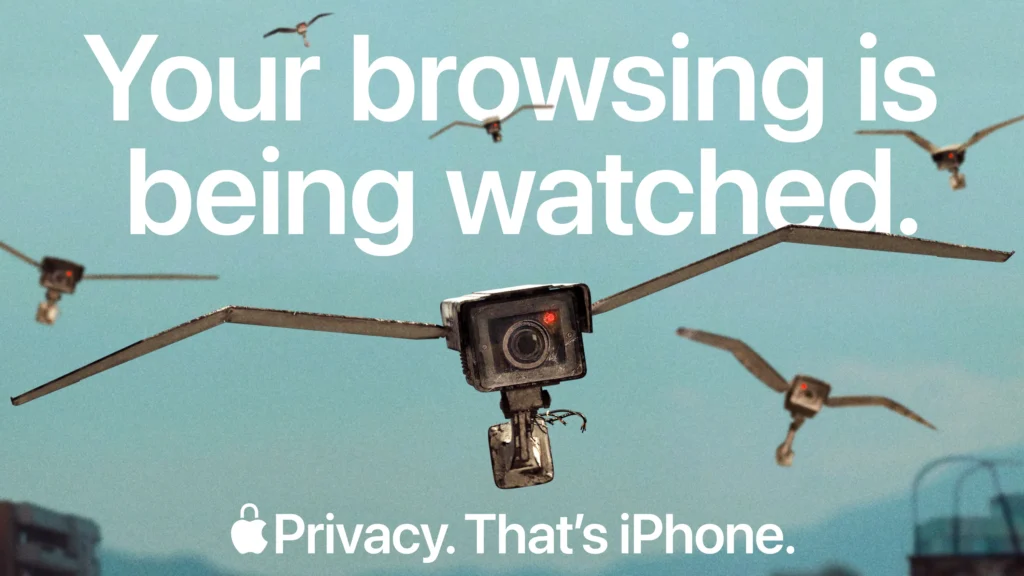Apple has launched a new campaign that quietly urges iPhone users to reconsider using Google Chrome. While Apple does not mention Chrome by name, its latest advertising effort clearly points towards the privacy risks associated with Google’s popular browser. Instead, Apple is promoting its own Safari browser as a safer alternative for those concerned about online privacy. This move comes at a critical time, especially after Google’s decision to maintain third-party tracking cookies in Chrome.

The Reason Behind Apple’s New Campaign
In a recent video titled “Privacy on iPhone: Flock,” Apple highlights how digital trackers, represented as birds, follow users across the internet. This creative ad subtly hints at Chrome’s data collection practices. While the message does not directly say “stop using Chrome,” it clearly suggests that Safari is a better choice for privacy-conscious users.
Reports indicate that Google has a strong interest in expanding Chrome’s presence on iPhones, aiming to grow its market share from 30% to 50%. In response, Apple is putting more focus on privacy concerns surrounding Chrome, especially after Google’s decision to retain third-party cookies. Originally, Google promised to remove these tracking cookies by 2022, but it changed its plan in July 2024, causing a lot of frustration among privacy advocates.
Third-party cookies are small data files used by websites to track your behavior across different sites. While they help advertisers create personalized ads, they also pose a serious risk to personal privacy. Apple’s recent campaign serves as a timely warning for users who may not realize how much of their personal information could be shared or exposed.
Ongoing Privacy Issues With Google Chrome
Over the years, Google Chrome has been involved in several controversies related to user privacy. One major issue was the misunderstanding around its Incognito mode. Many users believed that Incognito mode kept their browsing private, but it was later revealed that Google still collected some user data even during private sessions.
This led to a massive lawsuit, and in April 2024, Google agreed to a $5 billion settlement. As part of the agreement, the company promised to delete billions of data records and become more transparent about its data practices. However, despite the settlement, some users are still filing claims, asking for individual compensation.
Additionally, Google Chrome extensions have also been found to be problematic. Research showed that at least five popular Chrome extensions, with over 1.4 million downloads, secretly collected users’ names, locations, and browsing habits. Although these extensions were later removed from the Chrome Web Store, the incident raised questions about the security of Chrome’s ecosystem.
Critics argue that Google’s primary revenue comes from advertising, which heavily relies on user data. This business model makes it difficult for Chrome to prioritize privacy in the way that Safari does.
How Safari Protects Its Users
Safari has been designed with privacy at its core. One standout feature is Intelligent Tracking Prevention (ITP), which helps block trackers from following you across multiple websites. Safari also blocks third-party cookies by default, providing an extra layer of protection that Chrome users would have to enable manually.
Safari users can access a Privacy Report, which gives a clear overview of which trackers have been blocked during browsing sessions. This transparency helps users stay informed about who is trying to collect their data.
Private Browsing in Safari goes a step further by ensuring that browsing history, search activity, and auto-fill information are not stored. For users with an iCloud+ subscription, iCloud Private Relay offers additional security by hiding the user’s IP address and encrypting internet traffic. All of these features combine to make Safari a strong choice for iPhone users who value their digital privacy.
What iPhone Users Should Do Now
If you’re concerned about your privacy while using Google Chrome on your iPhone, here are a few steps you can take:
- Switch to Safari: Safari’s built-in privacy protections offer a more secure browsing experience without much effort.
- Clear Chrome Cookies Regularly: Regularly deleting cookies in Chrome can help limit tracking.
- Use Incognito Mode: Though not perfect, Incognito mode can help reduce data collection to a certain extent.
- Explore Other Private Browsers: Alternatives like DuckDuckGo or Brave provide strong privacy protections by default.
These simple changes can make a big difference when it comes to protecting your online identity and personal information.
Why This News Matters
Google’s decision to continue supporting third-party cookies has reignited global discussions about digital privacy. With billions of users depending on Chrome, the browser’s privacy policies impact a significant portion of internet users.
Apple’s new campaign comes at a critical time, serving as a reminder that protecting your online privacy requires active choices. This isn’t the first time Apple has focused on privacy in its marketing campaigns, and it likely won’t be the last.
As online threats and data breaches become more common, users are more cautious about who they trust with their information. Apple’s move to highlight Safari’s privacy features could not only attract more users but also reshape public conversations around digital privacy.
References:
- Tom’s Guide – Apple’s Ad Campaign Targets Chrome
- Time – Google Settles Incognito Mode Lawsuit
- The Mirror US – Apple Warns iPhone Users
- PhoneArena – Apple’s Privacy Ad Explained









